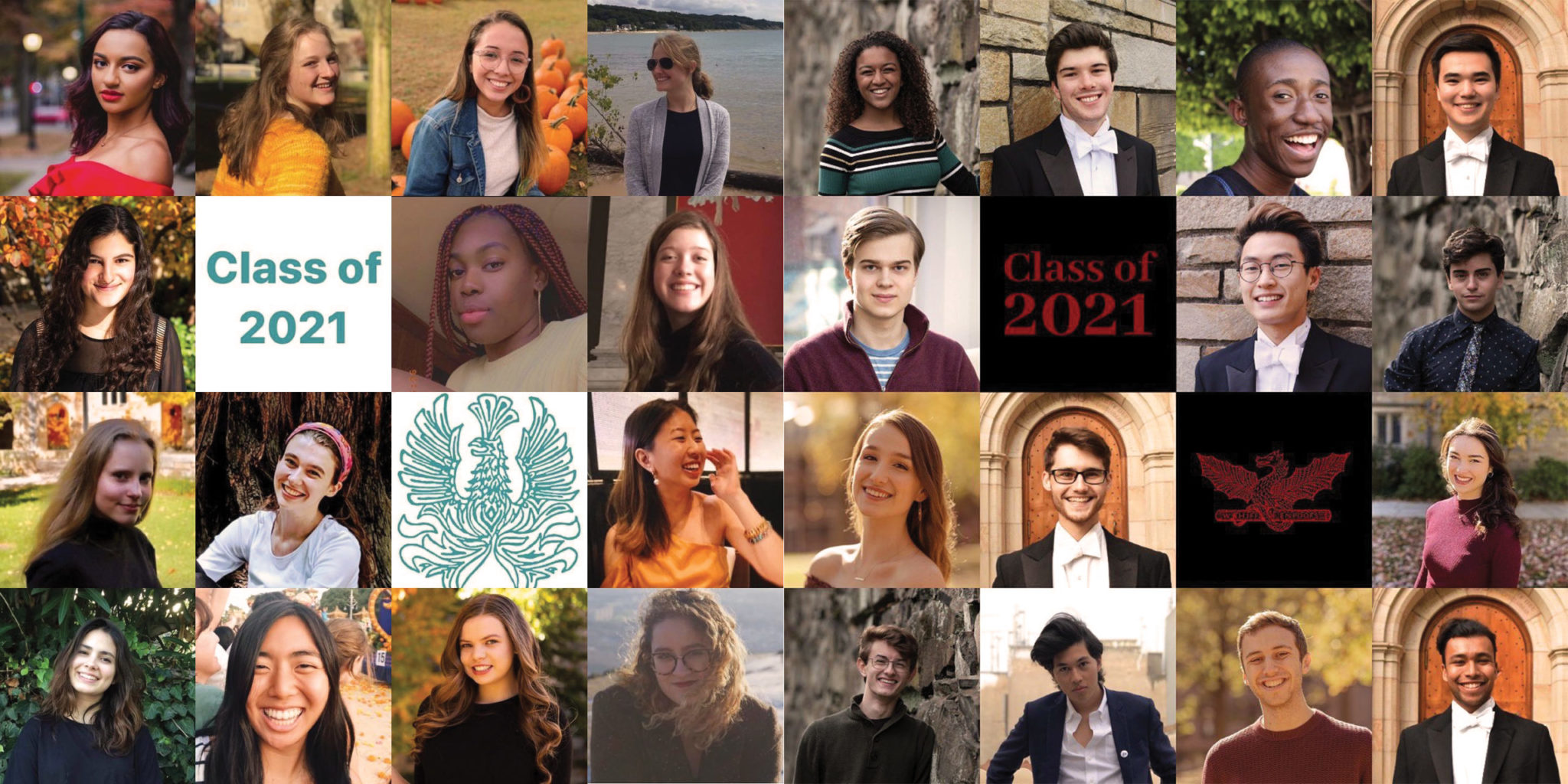
Courtesy of Whim 'n Rhythm and the Whiffenpoofs
The Whiffenpoofs — a historically all-male senior a cappella group — broke tradition once again this year and accepted multiple non-male members for the first time: Morgan Baker ’21, Lauren Bond ’21 and Emma Rutan ’21.
Yale’s two all-senior a cappella groups, the Whiffenpoofs and Whim ’n Rhythm, announced in 2018 that they would accept singers of all genders in their spring rush process. That year, the Whiffenpoofs admitted Sofía Campoamor ’20, the first female to sing in the group’s 100-plus-year history, and Neha Bhatt ’21, the first woman of color, joined the group in 2019.
“I was really overwhelmed and overjoyed — this has been a dream of mine since Sofía [Campoamor] made it possible a couple years ago,” Rutan said.
Rutan said she is honored to be part of this seminal moment in the group’s history.
“I think Yale College and the student body reflects inclusion for all people, and it’s about time that some of its older, more celebrated institutions follow suit,” Rutan said. “I don’t think gender integration will be a problem. It is something to explore and celebrate.”
Mark Gustaferro ’21, the business manager of the Whiffenpoofs of 2020, described the Whiffenpoofs’ incoming class as “uniquely talented” and “exceptional,” with each individual harboring powerful soloistic potential. He said the group’s increased inclusivity will greatly benefit its musical aptitude.
Gustaferro said the group admitted three non-male members because they were among the 14 best musicians that auditioned for them. He added that, for the past 108 years, the Whiffenpoofs have been “losing out on talent” by excluding non-males.
Gustaferro does not foresee a resulting impact on the social or business-related dynamics of the group. He said that most of the Whiffenpoofs’ clients are generally supportive and “on board with” the group’s increasing gender inclusivity. The Whiffenpoofs avoid clients who do not understand their mission, Gustaferro said.
“I don’t think the primary goal of the group has changed,” Gustaferro said. “It’s still to take the best senior vocalists and make really good music — inclusivity allows us to make better music as a group. That being said, I think we have augmented those principles with another principle, that the Whiffs accurately represent the talent at Yale and the pool of auditions we receive each year.”
Baker was the first non-binary student to be admitted to another traditionally all-male a cappella group — the Duke’s Men of Yale, now known as Doox — in 2017. According to Baker, referring to Tenor, Baritone and Bass as “male” voice parts and Soprano and Alto as “female” voice parts creates an assumption that vocal types are inherently biological. Yet they noted that the ranges of different vocal parts overlap. Baker said that there is “no hard or fast” distinction between these different parts.
Baker said it is important to have multiple non-male members, but they “wonder where there is to go from here.” Baker noted that, despite the group’s increasing gender inclusivity, it is unclear whether the Whiffenpoofs will ever have gender parity because of their repertoire’s musical range.
The Whiffenpoofs’ current repertoire only includes Tenor and Bass vocal parts. Gustaferro said that, because he is not directly involved with the group’s future musical decisions, he does not know whether the group will ever attain complete gender parity. But he noted that the group currently does not have the “musical infrastructure” to support equally gendered numbers. The group would have to develop a SATB — Soprano, Alto, Tenor and Bass — repertoire to support different types of voices and vocal ranges.
According to Gustaferro, each Whiffenpoofs class reflects the audition pool of that year. He said that if the number of non-male auditions increases in the coming years, the Whiffenpoofs’ tap classes will be representative of that increase. Yet he mentioned the group is also trying to diversify in terms of socioeconomic representation.
Bhatt, who was the group’s only female member last year, said her experience was “pretty positive.” She said her presence provoked mixed responses among audience members. Still, people were generally “curious and positive,” and often asked if the group would include greater numbers of female members in the future.
Bhatt said she is happy to see more representation from non-males, and hopes they have a great experience. While she cannot predict proportions of male and non-male members in the future, she said she believes the group is “in great hands” for the next year.
Bond said she hopes this inclusion will incite conversation about gender and power dynamics at conventional performance venues. She believes there is an “impetus” among campus a cappella groups to diversify both their membership and their audiences in order to reflect a wider range of experiences.
Rutan said she is grateful for Campoamor, Bhatt and all other non-males who auditioned for the Whiffenpoofs in past decades.
“[Campoamor and Bhatt] demonstrate extreme bravery and stewardship, but there were a lot of women and non-males before them that challenged the system to make a stance for something they disagreed with,” Rutan said. “The efforts of all those people have come together to make space for Lauren, Morgan and me.”
Freya Savla | freya.savla@yale.edu







